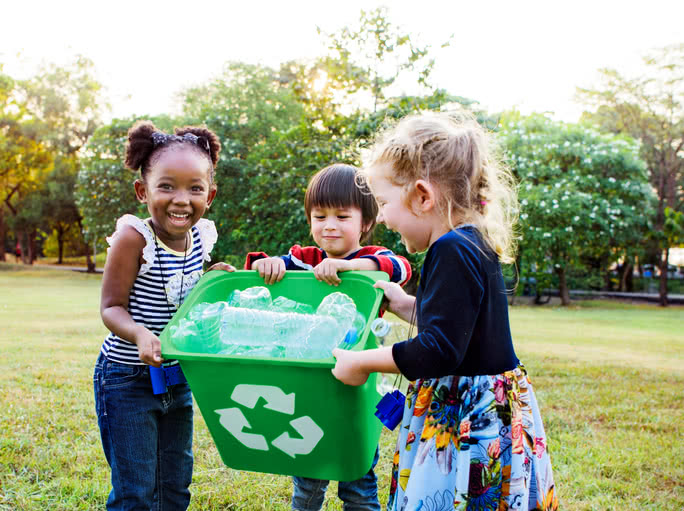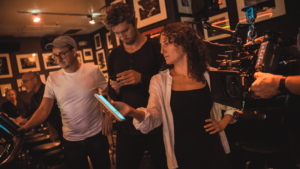You might think you have enough on your plate when organising an event to worry about being environmentally friendly. However, there are many low-effort, small changes you can make, that will have a big impact on the sustainability of your event.
We asked 20 planners to share with us the initiatives they’ve put into action at their events to be cleaner and greener. Read on and be inspired – you’re bound to pick up some easy tips you can incorporate into your next event.
Caroline Campbell, Eunomia Research & Consulting
“For our 15th anniversary we held an afternoon conference, followed by a party where the banana and salted caramel birthday cake was made out of food that would otherwise have gone to waste – a collaboration between a local baker Ahh Toots and the food waste charity Food Cycle.
“We also served Toast Ale which is beer brewed from surplus bread and chose Bristol’s Science Museum At-Bristol as our venue as it has fantastic sustainability credentials.”
Pilar Orti, Virtual not Distant
“Last month, I organised an event with around 30 people from over 10 different countries. It included talks, discussions, workshops, open-space style discussions and informal networking. The damage to the environment: zero – the event was entirely online!”
Marleitha Williams, Events By Cache
“One of my most successful initiatives in this regard was a reception where we went “paperless”. We used an app instead of printing anything out and my favourite eco-friendly idea for this reception was that the decorations were all edible flowers.
“It was a huge success. We did not save money; it ended up being more expensive actually, but the client was an environmental corporate so it was important to be sustainable.”
Natasha Zolotareva, CreativeMornings
“I run one of 178 chapters of CreativeMornings, a monthly breakfast lecture series. When I joined as a chapter leader, I wanted to make sure we kept the event green. Things we’ve done to achieve that include serving free coffee and teas to attendees who bring their own reusable mug and making all event signs reusable. We either print a sign and laminate it to be reused again and again or use chalk boards to create signs for the tables and decorate the room.
“We’ve had to refuse a few sponsors who suggested they’ll be serving food in plastic containers. Instead, we partner with individual bakers who bring baked goods and serve them on plates, avoiding any wrap or packages.”
Maury Chasteau-Simien, The Publicity Guy
As well as working for The Publicity Guy, my business partner and I run an events company in London called SignedMK. A way that we’ve made our events environmentally friendly is by trying to rely on natural light. If that is not possible we use eco-friendly light bulbs.
“We never waste food; we give leftovers to homeless people or shelters. We also have our team recycle where possible.”
Nicky Pratt, SEASONED
“At Seasoned we’ve always had the environment in mind and have strived to make our company even greener; we began with tackling CO2 emissions from our fleet of vehicles by tracking the volume of greenhouse gasses emitted from them and turning this into breathable air through an initiative we launched with the Woodland Trust that saw us plant a whopping 125m2 of new woodland in Heartwood Forest, Hertfordshire during 2016.
“We’ve also made our events greener by significantly reducing waste in the forms of food and materials by opting to use ‘wonky’ vegetables which are often rejected by caterers and supermarkets and sent unnecessarily to landfill. Our company has worked hard to crack down on materials being wasted by ensuring all glass, cardboard and plastic from our kitchens and events is recycled appropriately; in 2016 we amassed a total of 39 tonnes of recyclable material over the year and saved it from being sent to landfill.”
Paul Connolly, The Tax Shop Group
“I like to use creative thinking around the logistic organisation of events to naturally save the most resources. A good example is in regard to how far the participants would need to travel to an event; here I always aim to knock out at least two, sometimes three, birds with one stone.
“For example, in a recent event I did, I invited the smaller body of participants (industry accountants) to travel in from the surrounding areas to the local university, which was where the much larger bodies of participants (i.e. the students, and lecturers) already were.”
Natalie Cobb, Private Dining London
“We take public transport or cycle to meetings with clients in the London area where possible. We try to reuse and gift any leftover food, decor and floristry to prevent waste. For example, the flowers from our Secret Garden event were taken over to be used in our London Food Month event.
“We also find suppliers that are most local to the area where the event is being hosted. This cuts down fuel mileage and pollution on a small scale and it does save the client money in their budget. Every little bit helps!”
Max Robinson, FishTankBank
“The simplest thing we did to make our industry meet-ups more environmentally friendly was to provide a range of different recycling bins. We literally just made it as simple as possible for attendees to separate their litter, which not only helps to reduce the waste that we create, it also helped to enhance our brand.
“If you’re going to implement this at your next event, it’s not good enough to use a normal bin and attach a hand written sign to it – you need to show that you’re really making an effort by providing bins that will actually be suitable for the purpose. For example, you could provide a compost bin for fruit and vegetables.
“Believe it or not, this did actually save us money. In previous years we had to pay for a skip to hold all of the rubbish from the event, but by recycling, we managed to get a company to take it all away for free.”
Emmi Buck, Essential Oxygen
“For larger events or trade shows we have people bring their own water bottle or coffee mug, and for meetings, provide reusable cups for water and juice. No plastic bottles! If we’re serving or sampling food, especially at trade shows where it’s high-volume, we use biodegradable cups, plates, bowls, and utensils.
“We don’t pass out pens and paper, but use re-usable whiteboards and erasable markers or have people download an app for shared notes. We also don’t give out gimmicky, cheap branded things like pens. Instead, we give things like reusable water bottles or coffee sleeves that have seeds that can be planted.”
Martin Grohman, GAF
“Some quick things I’ve done include encouraging delegates to turn off the thermostats in their hotel rooms while they’re in the meeting. Why cool an empty room? I always recycle name tags, too. It seems like (and is) a small thing, but it sends an important message.
“I always meet with the hotel in advance, ask them about their recycling and get a tour of the back of the house. Having people to ask about their sustainable practices really makes a difference. Take pictures and highlight a couple of the things during the meeting, such as soap recycling. There are good programs for this and they should be doing it.”
Selina Donald, The Bulb
“It has been reported that almost 13% of landfill in the UK can be linked back to the event and hospitality industry. Landfill is everything from your one-off bespoke staging set to plastic giveaways and, the biggest culprit, leftover food. Think strategically when you are planning your event and explore alternatives to non-biodegradable materials such as PVC, vinyl and the dreaded foamex.
“Get in touch with social enterprises, such as the London-based City Harvest, if you think you will have food left over, and organise for them to collect it and redistribute to the homeless. Find a local printer that uses vegetable oil inks and recycled materials. Minimise waste by not over-ordering and, if you think there may be waste, order a collection from a responsible waste management supplier.”
Serena Holmes, Tigris Events
“We have leveraged re-usable shopping bags on a number of events. Not only do they offer a great branding opportunity, they are environmentally friendly and provide a long-term alternative to plastic bags during their day-to-day use.”
Kathryn Kellogg, Going Zero Waste
“There are a ton of options to keep your event green. Focus first and foremost on reducing your waste output by opting for real items instead of disposable items.
“Make sure you have a company providing recycling AND composting. Don’t landfill those food scraps! Organics can’t decompose in landfills due to lack of air. They release methane which is 20 times more powerful than CO2. Also, ask your vendors if they provide services to divert waste. Florists often have programs to have your flowers delivered to nursing homes or hospitals.”
Samantha Wilson, EcoEvents
“It is all in the planning. Serve less food by accurately estimating the volume of food required, considering the number of attendees, the event type and timings of the activities or breaks. Don’t be tempted to over-order or buy last minute add-ons through fear of there not being enough. Go for quality rather than quantity and tell a story with your food. Who made it, where did it come from? Weave this into your event experience so the food becomes a part of the narrative.
“Is there any historic data that can inform previous food wastage? This may be available, for example, on waste transfer notes or event debrief notes. Engage all relevant third parties and keep everyone in the comms loop – suppliers can be a source of free consultancy (they know their job better than you do) so listen to them and use their expertise in your planning.”
Sandro Galindo, SouperBowl CLE
“For our annual soup crawl/contest, the SouperBowl CLE, we use compostable 2 oz cups and compostable spoons for our 400 attendees every year.
“We are shooting to be as close as possible to a near-zero waste event.”
Jacqui Davidson, Software Acumen
“We advise our event participants to bring digital tickets on their phones, rather than print them out. We always recycle all paper at events and select venues often on sustainable credentials.
“We always try to recycle the plastic badge wallets by reusing them for at least two, if not three, events. Participants are always happy to give them back to us when we explain that we reuse them and this makes it better for the environment and also our costings.”
Lizz Torgovnick, Sequence
“We will often focus on making our event décor reusable. At a recent non-profit gala event, we incorporated school supplies into the centrepieces which spoke to the evening’s theme. We later removed the supplies and donated them to youth centres in need. In this case, it wasn’t necessarily about saving money, but about reducing waste.
“The product we most often recommend for an event staple are step and repeat banners, which allow us to reuse the aluminium frame for many events. We own the frame to a few standard sizes so when we order the banners we don’t need to buy a new frame every time. This saves our clients’ money as well.
“In general, we have moved away from hard sets which are typically built from wood and then cut, wrapped or painted to be custom. Sometimes that’s the look the client wants, but there are so many reusable fabric and modular products out there that it’s less and less necessary to use wood for a custom look.”
Melanie Tindell, Oak & Honey Events
“As an event planner, communication and working closely with the vendor teams is the key to have successful green events. One of our most successful initiatives is floral, we work closing with local florists to source in season local flowers and look at container options not that do not require floral foam.
“After the event we donate the flowers to a nursing home or hospice centre or send them to be composted. The client sees savings by the flowers being purchased locally and being purposed after the event.”
Peter Carson, Envision IT
“When we hold events and meetings, we have made a conscious effort to make them as environmentally friendly as possible by limiting and eliminating (when possible) the use of printed paper documents.
“We make use of online presentation tools and digital recording capabilities to present information during these meetings, and we encourage the use of laptops and digital note taking as opposed to using paper pads. We find this is more effective for the environment, as well as our productivity, as notes written on pads are more often than not forgotten somewhere or just thrown out. By making this change in our meetings, we have reduced our paper usage by over 25%.”
Conclusion
These eco tips not only help you save the Earth; they could actually save you money. On top of that, you can promote your efforts as unique features of your event. Your delegates are bound to love any quirky initiatives, winning you extra brownie points.





